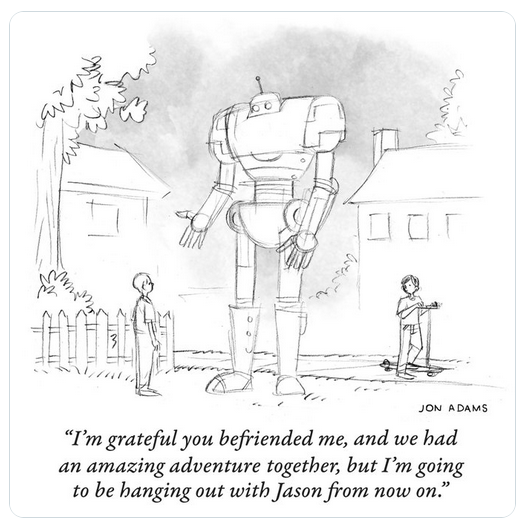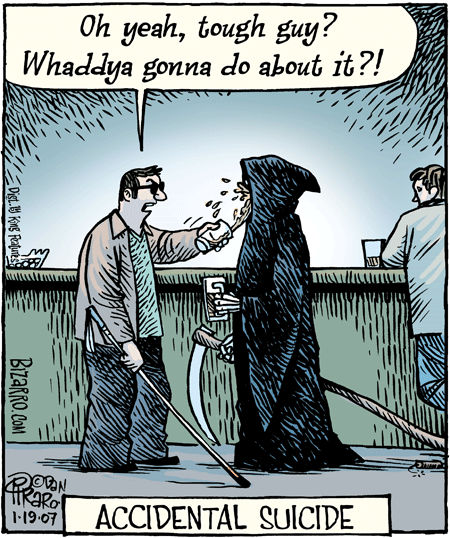Tell me a joke! The OF humor thread [No politics/religion]
Tony C.
··Ωf Jury memberThat's the one you find inaccurate?
Actually, yes. Of course I'm not referring to absurdist humor, which I happen to like very much, and which is abundant here. But with the joke in question, the more that a viewer believes the essential message to be accurate, the more effective it is. So my reaction was essentially that the premise is so inaccurate, the joke doesn't work very well.
It's a bit like when people argue that the world isn't becoming hotter because it's currently snowing where they live. 😁
pdxleaf
·. So my reaction was essentially that the premise is so inaccurate, the joke doesn't work very well.
So all the misogynistic stuff is different?
‐‐----------
Little Billy hears screaming coming from his parents door and goes to investigate.
He opens the door and sees his parents going at it. His dad says, "Go to your room, Billy. I'll be there to tuck you into bed in 20 mins."
Twenty minutes later his dad hears screaming from Billy's room. He opens the door and sees Billy screwing his grandmother. The dad yells "What the hell are you doing?!"
Billy says? "It's not so funny when it's your mom!"
Tony C.
··Ωf Jury memberSo all the misogynistic stuff is different?
I would say that they aren't analogous. To take it a step or two further, well-constructed misogynist, or even racist jokes, can be very funny, in my view. Of course they may offend some, or even many, and we could argue about where and when it should, or should not be appropriate to display (or tell) such jokes. But as there is often at least a small amount of truth to be found in stereotypes, it is possible for people, including many who are neither misogynists, nor racists, to "get", and appreciate the jokes.
In contrast, the premise of the subject joke is false, as technology in the form of mobile phones actually has, broadly speaking, degraded the social skills of the generations that were weaned on such devices. So in order for the joke to really work, it would be necessary for readers to set that rather inconvenient fact aside.
Put in much simpler terms, that joke doesn't work, while those jokes that might be distasteful to many people, often do.
Edited:
Tony C.
··Ωf Jury memberThanks. No doubt some are, and I'd like very much to be wrong about the others.
p4ul
·^ plus one!
EDIT : post above removed?
EDIT : post above removed?
Edited:
BlackTalon
··This Space for RentPeople reading newspapers -- they are largely being antisocial.
People playing on their phones -- many may be texting or otherwise socially interacting with others.
People playing on their phones -- many may be texting or otherwise socially interacting with others.
Tony C.
··Ωf Jury memberPeople reading newspapers -- they are largely being antisocial.
People playing on their phones -- many may be texting or otherwise socially interacting with others.
Reading newspapers was not then, nor is it not now, "antisocial" behavior. Virtually no one read (or reads) newspapers for 6, 8, or 10 (or more) hours a day. You also can't define "antisocial" as any action that happens to temporarily preclude socializing. If young people were only on their phones for an hour a day, the impacts would be dramatically different.
It is true that there is a great deal of a form of social interaction on phones, but the original, and widely accepted (and relevant) definition of "antisocial" is not being sociable or wanting the company of others. I would argue that there is a rather large, and important distinction between socializing on-line, and face to face. Mobile phone use has undoubtedly had a meaningful impact in extending the former, and reducing the latter.
BlackTalon
··This Space for RentEveryone has different experiences. My son's mobile phone allows him to interact with his friends and grandparents a lot more than he could do otherwise. There are no other kids his age within walking distance, so they largely interact in the afternoons/ evenings via mobile phone. A mobile phone has been an immense help in getting his to socialize more.
Tony C.
··Ωf Jury memberNo doubt there are many positive aspects to them, but there's also a meaningful amount of what might be considered related, addictive behavior.
Tony C.
··Ωf Jury memberlindo
·No doubt there are many positive aspects to them, but there's also a meaningful amount of what might be considered related, addictive behavior.
Hi @Tony C. It is rather nice that my wry little contribution sparked off a real discussion from you about the impact of mobile phones on today's world. They are undoubtedly addictive devices - mine is a constant companion that provides access to knowledge on things I want to google, instant messaging from family and friends, weather reports and so on. And as someone who remembers the days when we had to rely on public phone boxes when out and about, having the modern ability to call anyone at any time from anyplace (with signal access), I am glad to have them.
However I agree with your reservations. Dodging phone zombies in public places, trying to get kids to put the damn things away when we are having family gatherings, watching drivers wobble over the road while they look at their phones, and similar frustrations are familiar to all of us.
Comparing them with people reading newspapers is facetious, but it still made me smile.
Tony C.
··Ωf Jury memberComparing them with people reading newspapers is facetious, but it still made me smile.
Thanks. I wasn't in any way criticizing you, but merely commenting on the content, and what provoked my reaction was that many, if not most internet users, would probably think, at least initially, that the two are comparable.
While I obviously do have serious concerns about some of the impacts of mobile devices on societies, and on young people in particular, I am a heavy internet user, and something of a "digital nomad" these days. So I am ambivalent at worst, and have benefited in many ways from the digital (online) revolution.
Having said that, I completely disconnect whenever I leave the house, partly in order to provide some balance, and partly because I really have no interest in being distracted from the real world.
Speed2Sea
·What a bummer I used to come to this thread for a good laugh.
BlackTalon
··This Space for RentEasy enough to look up tons of jokes on your mobile phone 

lindo
·Tribal wisdom passed on from generation to generation says that, "When you discover that you are riding a dead horse the best strategy is to dismount".
However, in the corporate and government world more advanced strategies are often employed, such as:
1. Using a stronger whip.
2. Changing riders.
3. Appointing a committee to study the horse.
4. Arranging a visit to other countries to see how other cultures ride dead horses.
5. Lowering the standard so that the dead horse can be included.
6. Reclassifying the dead horse as being living-impaired.
7. Hiring quality accredited outside contractors to ride the dead horse.
8. Harnessing several dead horses together to increase speed.
9. Providing additional counselling and/or training to increase the dead horse's performance.
10. Doing a productivity study to see if lighter riders would improve the dead horse's performance.
11. Declaring that as the dead horse does not have to be fed, it is less costly, carries lower overhead and therefore contributes substantially more to the bottom line of the economy than do some other horses.
12. Rewriting the expected performance requirements for all horses - unions can make a major contribution in this process.
AND.....a favourite
13. Promoting the dead horse to a supervisory position.
However, in the corporate and government world more advanced strategies are often employed, such as:
1. Using a stronger whip.
2. Changing riders.
3. Appointing a committee to study the horse.
4. Arranging a visit to other countries to see how other cultures ride dead horses.
5. Lowering the standard so that the dead horse can be included.
6. Reclassifying the dead horse as being living-impaired.
7. Hiring quality accredited outside contractors to ride the dead horse.
8. Harnessing several dead horses together to increase speed.
9. Providing additional counselling and/or training to increase the dead horse's performance.
10. Doing a productivity study to see if lighter riders would improve the dead horse's performance.
11. Declaring that as the dead horse does not have to be fed, it is less costly, carries lower overhead and therefore contributes substantially more to the bottom line of the economy than do some other horses.
12. Rewriting the expected performance requirements for all horses - unions can make a major contribution in this process.
AND.....a favourite
13. Promoting the dead horse to a supervisory position.
Tony C.
··Ωf Jury memberThis ^ is really excellent!

